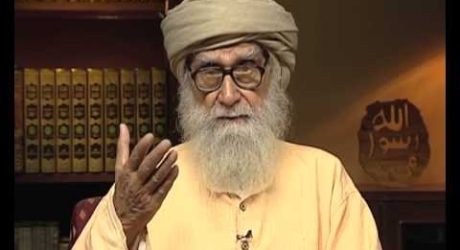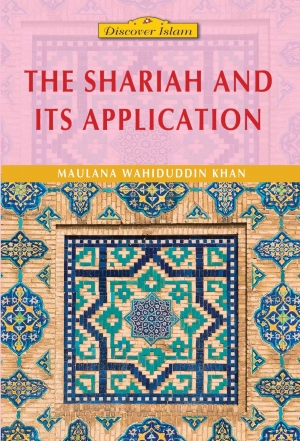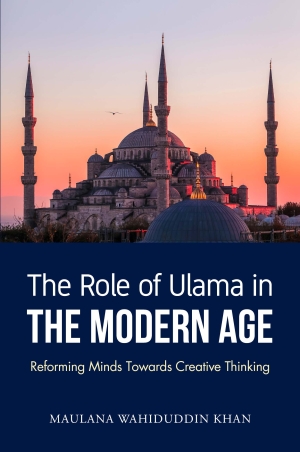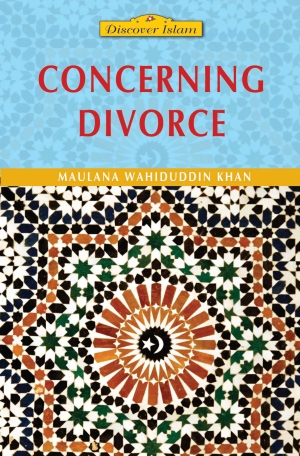Although Islam permits divorce, it emphasises that it is a concession and a measure to be resorted to only when there is no alternative. Seeing it in this light, the prophet Muhammad said, "Of all things permitted, divorce is the most hateful in the sight of God." (Sunan Abu Dawood, Hadith No. 2178)
Nature demands that men and women lead their lives together within the bonds of marriage. In Islam, marriage is a civil contract entered upon by mutual consent of the bride and the groom and a highly sacred bond to which great religious and social importance is attached. As an institution, it is a cohesive force in society. Maulana Wahiduddin Khan explained that while marriage is the rule of life, divorce is only an exception but must also be accepted as a reality. Although Islam permits divorce, it emphasises that it is a concession and a measure to be resorted to only when there is no alternative. Seeing it in this light, Prophet Muhammad said,
"Of all things permitted, divorce is the most hateful in the sight of God." (Abu Dawood, Sunan, Kitab at-Talaq, 2/255.)
When a man and a woman live together as husband and wife, it is natural that they should have their differences. Nevertheless, they must strive to unitedly despite differences. This can be achieved only through patience and tolerance, virtues advocated by the prophet not only in a general sense but, more importantly, in the particular context of married life. Without these qualities, there can be no stability in the marriage bond. However, despite all safeguards, it sometimes does happen that a couple reaches a stage of such desperation that they become intent on separation. Here the Shariah gives them guidance in that it prescribes a specific method for separation. The Quran expresses it thus:
"Divorce may be pronounced twice; then a woman must be retained in honour or allowed to go with kindness". (2: 229)
This verse has been interpreted to mean that a man who has twice given notice of divorce over a period of two months should remember God before giving notice a third time. Then he should either keep his spouse with him in a spirit of goodwill, or he should release her without doing her any injustice.
For marriage, one utterance is enough, but three utterances are required for a divorce to be finalised, between which the Shariah has prescribed a long gap.
Featured Articles
Featured Videos
FAQs
Although Islam permits divorce, it lays great emphasis on it being a concession, and a measure to be resorted to only when there is no alternative. Seeing it in this light, the Prophet Muhammad said:
“Of all things permitted, divorce is the most hateful in the sight of God.” (Sunan Abi Dawud, Hadith No. 2178)
When a man and a woman live together as husband and wife, it is but natural that they should have their differences; it being a biological and psychological fact that each man and woman born into this world are by their very nature quite different from each other. That is why the sole method of having unity in this world is to live unitedly in spite of differences. This can be achieved only through patience and tolerance, virtues advocated by the Prophet not only in a general sense, but, more importantly, in the particular context of married life. Without these qualities, there can be no stability in the bond of marriage.
However, it has to be conceded that life does not always function smoothly. Despite all safeguards, it sometimes does happen that a couple reach a stage of such desperation that they become intent on separation. Here the Shariah gives them guidance in that it prescribes a specific method for separation. The Quran expresses it thus:
“Divorce may be pronounced twice, then a woman must be retained in honour or allowed to go with kindness.” (2: 229)
This verse has been interpreted to mean that a man who has twice given notice of divorce over a period of two months should remember God before giving notice a third time. Then he should either keep his spouse with him in a spirit of goodwill, or he should release her without doing her any injustice.
This method of divorce prescribed by the Quran, i.e. taking three months to finalize it, makes it impossible for a man seeking divorce suddenly to cast his wife aside. Once he has said to his wife, “I divorce you,” both are expected to think the situation over for a whole month. If the man has a change of opinion during this period, he can withdraw his words. If not, he will again say, “I divorce you,” and they must again review the situation for a further month. Even at this stage, the husband has the right to revoke the proceedings if he has had a change of heart. If however, in the third month, he says, “I divorce you,” the divorce becomes final and the man ceases to have any right to revoke it. Now he is obliged to part with his wife in a spirit of good-will, and give her full rights.
This prescribed method of divorce has ensured that it is a well-considered, planned arrangement and not just a rash step taken in a fit of emotion.
Source: Spirit of Islam December 2016
Islam allows for only one sort of physical relationship between men and women, and that is in the form of marriage which is announced and publicly known. It is inevitable that differences will arise between the spouses. According to Islam, the way out is not by seeking to wipe out these differences but, rather, to accept them, to seek to reconcile them, or for the spouses to continue to live together despite their differences.
Yet, it sometimes happens that the spouses are unable to properly manage their differences and so decide to go in for a divorce. Divorce has been accepted in Islam as something that can be resorted to in extreme circumstances. At the same time, Islam frowns upon divorce. According to a Hadith, although divorce is permissible, God does not like it.
Islam allows for only one sort of physical relationship between men and women, and that is in the form of marriage which is announced and publicly known.
Very often, divorce is resorted to in anger, and this is why Islam has devised a method to control it. The Quran says that a man can give two revocable utterances of divorce, after which he can retain his wife and stay together on equitable terms or else leave her in kindness (2:229). This is the prescribed method of divorce as laid down in the Quran. Accordingly, a man who intends to divorce his wife should issue the first utterance of divorce in the first month, and the second utterance in the next month. After this, he can revoke his divorce pronouncement if he wants. But in the third month, if he issues the third utterance of divorce, it is irrevocable and the two can no longer be considered husband and wife.
Source: Spirit of Islam April 2014
Talaq has to be uttered three times separately over a three-month period. Saying talaq three times at one time will be counted as one talaq.
Despite all the preventive measures for a divorce, it does sometimes happen that a man acts in ignorance, or is rendered incapable of thinking dispassionately by a fit of anger. Then on a single occasion, in a burst of temper, he utters the word “divorce” three times in a row, “talaq, talaq, talaq!” Such incidents, which took place in the Prophet’s lifetime, still take place even today. Now the question arises as to how the would-be divorcer should be treated. Should his three utterances of talaq be treated as only one, and should he then be asked to extend his decision over a three-month period? Or should his three utterances of talaq on a single occasion be equated with the three utterances of talaq made separately over a three-month period? There is a Hadith recorded by Imam Abu Dawud and several other traditionists which can give us guidance in this matter:
“Rukana ibn Abu Yazid said “talaq” to his wife three times on a single occasion. Then he was extremely sad at the step he had taken. The Prophet asked him exactly how he had divorced her. He replied that he had said ‘talaq’ to her three times in a row. The Prophet then observed, ‘All three count as only one. If you want, you may revoke it.’” (Sunan Abi Dawud, Hadith No. 2196)
Islam prescribed the method of divorce over a period of three months to ensure that it is a well-considered, planned arrangement and not just a rash step taken in a fit of emotion.
Source: Spirit of Islam December 2016
The method of divorce over a period of three months was devised so that if the husband, in a fit of anger, wants to divorce his wife but later, when his temper cools down, changes his mind and wants to carry on with the marriage, he can do so. If his utterance of divorce is not out of anger but is a planned step where all possible means of reconciliation have proved futile, and with all sincerity thinks that divorce is the only option left, then he has to wait till the third month in order for it to take effect. This pragmatic method of divorce was followed in the early period of Islam. But towards the end of the period of the first Caliph, Abu Bakr, some men, out of anger, began issuing three utterances of divorce in one sitting. At this time, this practice was an exception, but by the time of the latter half of the period of the Caliphate of Umar, the second Caliph, it had become increasingly common.
In the face of this, and in his capacity as Caliph, Umar decided to take action against this misuse of the law. And so, in the case of some men, he accepted their issuing three utterances of divorce in one sitting as constituting an irrevocable divorce. But, along with this, he also arranged for these men to be punished.
However, this method of divorce remains fairly widespread today, especially in the Indian subcontinent. Men arbitrarily utter the word talaq three times in one breath, often in anger. This is a misuse of Shariah laws and is a grave sin on the part of the husband. This practice has become very common today, and it urgently demands that the position of the Shariah on the matter be clarified.
One way out of this dilemma is to consider that the utterance of the word talaq three times by the husband in a fit of excess emotion or anger to be equal to just one utterance. If the husband was not serious about the divorce, then he can revoke it soon after. And, if he actually wishes to divorce his wife, then he should do it according to the method prescribed by the Quran, over a period of three months.
Source: Spirit of Islam April 2014









